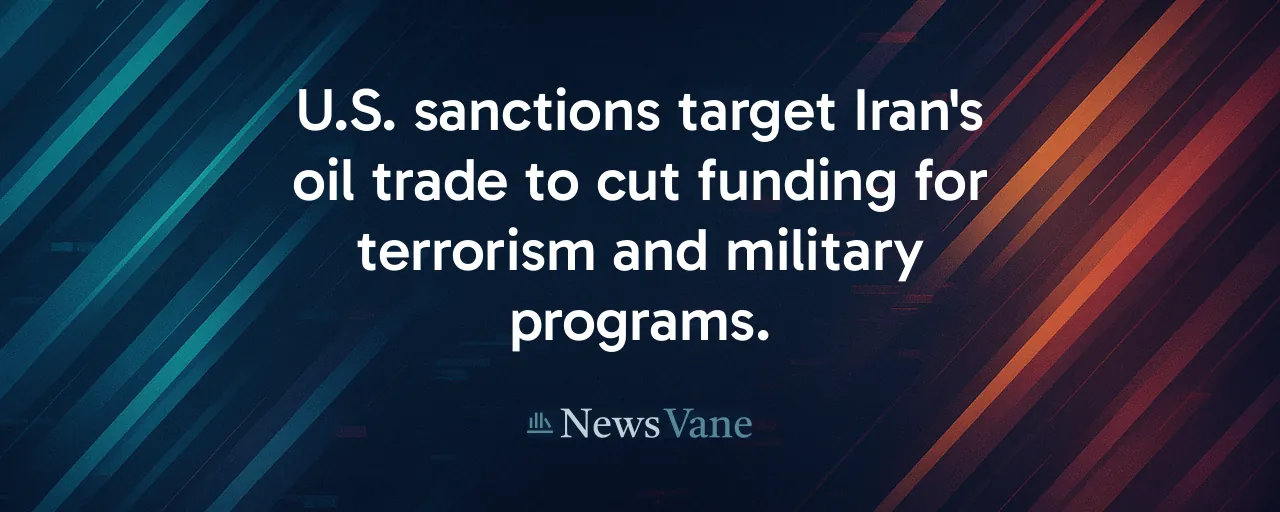A New Wave of Sanctions Strikes Iran
On July 3, 2025, the United States unveiled a fresh round of sanctions aimed at Iran's oil trade, targeting six companies and four vessels accused of smuggling petroleum to fund terrorism. The measures, led by the State Department and Treasury, zero in on a network allegedly run by Iraqi businessman Salim Ahmed Said, which blends Iranian oil with Iraqi crude to evade detection. This marks the tenth sanctions package since February, part of a broader strategy to choke off Tehran's revenue streams.
The goal is clear: deny Iran funds that the U.S. claims bankroll proxy militias, missile programs, and domestic oppression. This approach, however, raises a thorny question. Can economic pressure force change without crushing ordinary Iranians or destabilizing global markets? The answer hinges on execution, intent, and the willingness to pair punishment with pragmatism.
The Mechanics of Maximum Pressure
These sanctions, authorized under Executive Orders 13846 (2018), 13902 (2020), and 13224 (2001, amended), target anyone handling Iranian oil, from shadowy tanker operators to foreign buyers. The U.S. accuses Iran of exporting 1.6 to 1.8 million barrels daily, mostly to Chinese refineries, using 'dark-fleet' ships that dodge tracking systems. By sanctioning intermediaries like Said's network, Washington aims to disrupt this flow and starve Tehran of cash.
Historical data shows mixed results. Sanctions slashed Iran's GDP by several points in the late 2010s, but Tehran adapted, building a vast smuggling web. Today's measures focus on secondary sanctions, pressuring foreign banks and ports to comply. While effective at raising costs, enforcement is tricky. Iran's oil still reaches markets, suggesting pressure alone may not deliver the desired shift in behavior.
The Human Cost of Economic Warfare
Sanctions affect elites and ripple through Iran's economy, where inflation and medicine shortages already plague civilians. Research links past measures to currency depreciation and inflation, disproportionately affecting low-income families while elites exploit smuggling profits. While the U.S. insists humanitarian exemptions protect essentials, aid groups report delays and confusion, leaving vulnerable Iranians caught in the crossfire.
This tension fuels debate. Advocates of tough measures argue the pain is necessary to curb Iran's regional influence. Others warn broad sanctions empower hardliners, alienate civilians, and erode trust in diplomacy. Striking a balance requires precision, ensuring pressure targets those in power while shielding the public from undue harm.
Global Markets Feel the Squeeze
Iran's oil, though discounted, accounts for about 2 percent of global supply. A total export halt could push prices up by $5 to $10 per barrel, studies suggest, hitting consumers worldwide while boosting rival producers like Saudi Arabia. Shipping firms and insurers also face higher costs to comply with U.S. rules, passing expenses to markets already jittery from geopolitical risks.
China, Iran's top buyer, complicates matters. Its independent refineries rely on cheap crude, and Beijing often resists U.S. pressure. Sanctions may disrupt some flows, but without multilateral cooperation, Iran's oil will likely find buyers, underscoring the limits of unilateral action in a connected world.
Lessons From the Past
Sanctions are not new. The U.S. froze Iran's assets in 1979, expanded penalties in the 1990s, and ramped up pressure after exiting the 2015 nuclear deal. The 2019-2020 campaign crippled Iran's economy but failed to halt its nuclear advances or proxy activities. By 2025, Iran's smuggling network is more sophisticated, with deeper ties to Chinese buyers, making today's task harder.
Research points to a pattern: sanctions work best when paired with clear diplomatic goals. The 2015 nuclear deal, for instance, saw Iran scale back enrichment in exchange for relief. Without such off-ramps, economic pain often entrenches defiance, raising the stakes for today's approach.
Crafting a Smarter Strategy
A purely punitive path risks escalation, from higher oil prices to regional flare-ups. Experts suggest blending sanctions with incentives. Time-limited oil-for-aid programs, monitored by neutral bodies, could ease civilian suffering while keeping pressure on Tehran. Targeted financial penalties on Iran's leadership, rather than broad embargoes, might also minimize collateral damage.
Multilateral efforts could amplify impact. A task force with Gulf states and Asian importers could crack down on dark-fleet tankers, while information-sharing with insurers would curb accidental violations. Such steps demand cooperation, a challenge given strained U.S.-China ties and competing regional agendas.
Balancing Act for the Future
The latest sanctions reflect a resolve to confront Iran's actions, but their success depends on clarity and adaptability. Economic pressure can signal strength, but without diplomatic channels, it risks entrenching conflict. Policymakers are tasked with weighing the trade-offs, ensuring measures target those in power and avoid disproportionately affecting the powerless.
Global stakeholders, from oil importers to human rights groups, have a stake in the outcome. A strategy that pairs enforcement with engagement could unlock progress, offering Iran incentives to de-escalate while safeguarding civilian welfare. The path isn't easy, but precision and pragmatism could make the difference.
As the world watches, the challenge is to craft policies that curb threats without sowing chaos. Sanctions are a tool, not a complete solution. Their legacy will depend on how well they balance principle with practicality, offering a way forward that serves both security and humanity.
